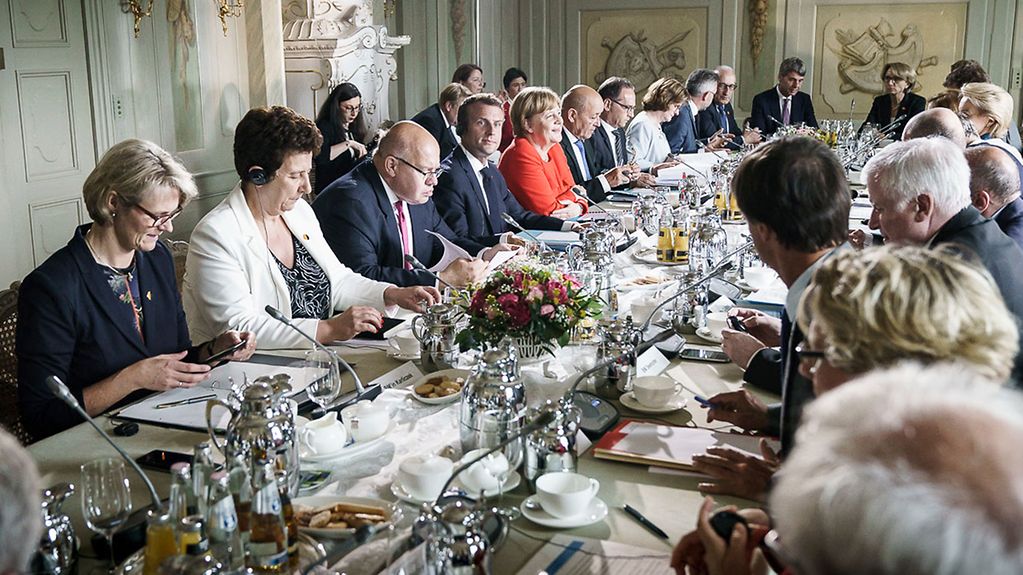Franco-German ministerial meeting
Federal Chancellor Merkel and French President Macron have agreed on joint reform proposals for the European Union. They agreed to set up a Eurozone budget, starting from 2021. They also provided impetus for a European Security Council.
2 min reading time

Franco-German working session.
Photo: Bundesregierung/Denzel
Europe must play a part when it comes to the defence of values, of beliefs, prosperity, spreading peace in the world, and the preservation of the environment, emphasised the Chancellor.
"We need European answers. And this also means that Europe must find its place in a multilateral world," said Merkel after a meeting with French President Emmanuel Macron in Schloss Meseberg, the official state guest house of the German Federal Government.
Europe is facing four major challenges which require joint answers: the foreign and security policy, the European migration and asylum policy, the future of the economic and monetary union, as well as the competition policy. These issues have been summarised by Germany and France in the Meseberg Declaration.
Foreign and Security Policy
"Becoming politically more capable of action" and "presenting a united front". These are the key factors, especially in foreign and security policy, according to Merkel. This means that one does not always need unanimity when making decisions. The European foreign and security policy must be spread even more, in a world that is rapidly changing. A European Security Council would help in that regard.
Migration
"Our goal remains a European answer to the challenge of migration," said Merkel. This includes:
- First of all, eliminating the causes of migration: this requires peace work and development aid.
- Cooperating with the countries of origin and transit countries.
- Protecting the EU’s external borders, by making significant additional staff available for the border protection agency Frontex.
- Harmonising asylum standards, so that asylum seekers do not move on to other EU member states.
This requires a coordinated approach, ideally on a European basis, but we could also envisage cooperation between individual countries, the Chancellor said. Macron promised help in this regard.
Strengthening the economic and monetary union
"This was the most complicated part," conceded the Chancellor. Germany and France have agreed to set up a Eurozone budget, starting from 2021. The funds should be used for investments to promote economic convergence in Euro countries, said Merkel. The Chancellor also reiterated her commitment to expanding the European Stability Mechanism (ESM) rescue fund into a European Monetary Fund.
Competitiveness
Germany and France want to give fresh impetus for an economically-strong Europe, especially in the field of artificial intelligence and other important areas of research.
The Chancellor expressed her confidence: "We had a good discussion, and today is a good day for Franco-German friendship and cooperation." This is opening a new chapter with a broad spectrum of initiatives for the European Union, but also for Franco-German cooperation.
The Chancellor invited the French President as well as German and French ministers to a meeting at Schloss Meseberg. Together they worked on preparations for the European Council on 27 and 28 June, and on finding solutions for the issues Europe is facing. EU Commission President Jean-Claude Juncker was also invited. Together with him and French President Macron, the Chancellor met chairpersons of leading European companies, who belong to the European Round Table of Industrialists.